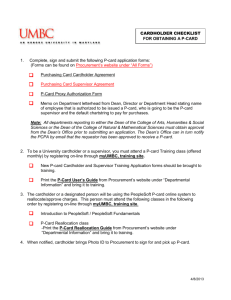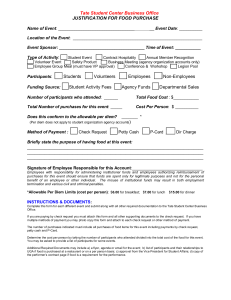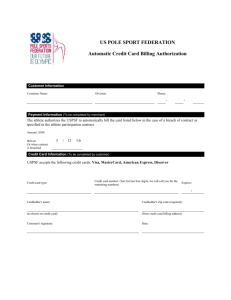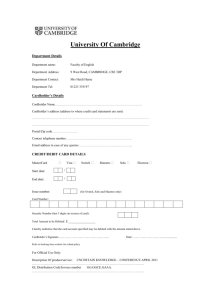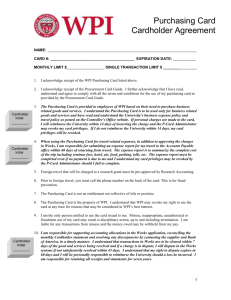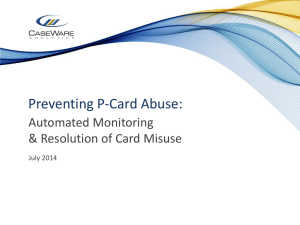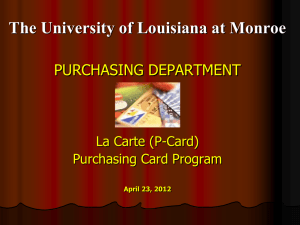P-Card procedures - NSW Treasury
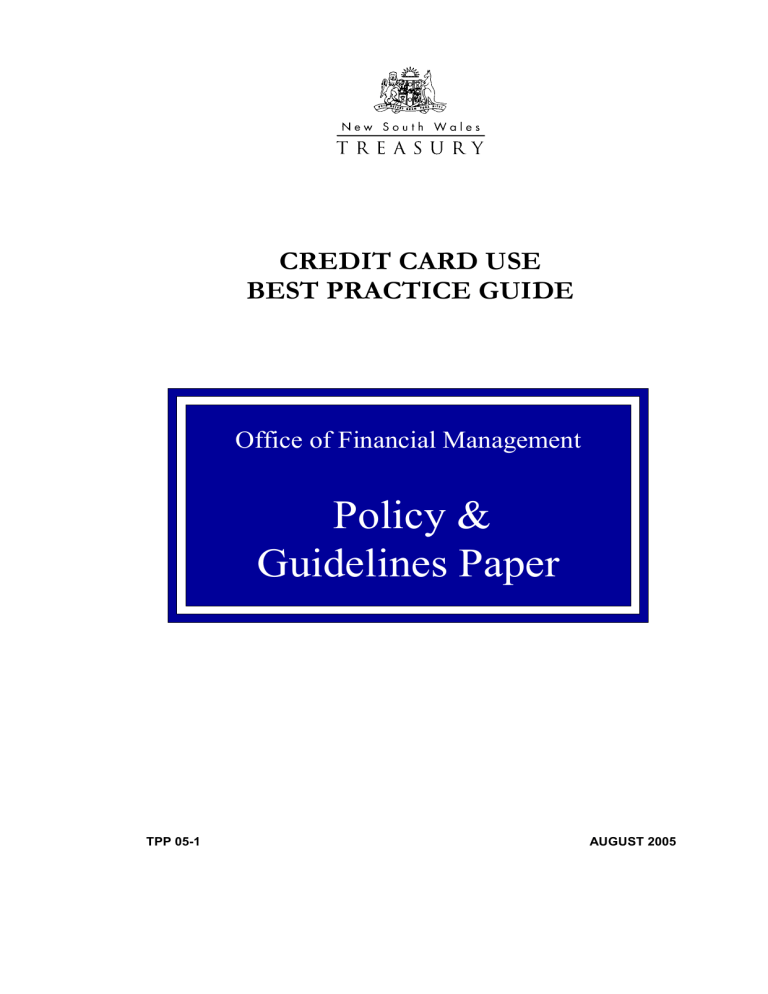
TPP 05-1
CREDIT CARD USE
BEST PRACTICE GUIDE
Office of Financial Management
Policy &
Guidelines Paper
AUGUST 2005
PREFACE
These guidelines outline the policies, guidelines and generic procedures that should be adopted by agencies for the implementation and maintenance of the NSW Government
Corporate Purchasing Card. In December 1998 the Premier requested the Director-General
Premier’s Department and the Secretary of NSW Treasury to conduct a review of the use of credit cards by Senior Executive Officers in Government agencies. A joint NSW Treasury and Premier’s Department Review Committee undertook the required review noting that the
Auditor-General stated in his report that "The corporate credit card is an efficient method of procurement for large volume, low value and low risk purchases".
To address the Premier’s concern the Committee developed the Best Practice Guide that included a revised section of Treasurer’s Directions incorporating the Committee’s conclusions. It also includes a draft schedule of cardholder responsibilities and an example of an agency policy document (developed by the Department of Primary Industries) that can be adapted to suit the operations of other agencies.
Results from the recent six monthly survey on credit cards for the Treasury Banking System
(TBS) indicated the need to update the review and the following sections have been added or amended to assist TBS agencies:
1)
Amendment to Treasurer’s Directions
205.04 and 205.07
2) Approval – Public Authorities (Financial Arrangements) Act 1987 (PAFA ACT)
3) PAFA Act Application Form
4) Guide to Credit Card Usage on the Internet
5) Credit Card Compliance Survey
6) Agency Policy Document – Department Primary Industries (Updated)
These guidelines replace the NSW Treasury Policy and Guidelines Paper TPP99-2 “Review of Credit Card Use-Best Practice Guide” dated June 1999. The new guidelines should be read in conjunction with the sections of the Public Finance and Audit Act 1983 as specified in the Executive Summary. As part of their performance review with their Minister, CEOs must certify that credit card use in their department has been in accordance with Premier’s
Memoranda and Treasurer’s Directions. The certification should also be included in annual reports. The “Credit Card Use –Best Practice Guide” is a guide to assist TBS Agencies in the implementation and management of the NSW Government Credit Card.
Ian Neale for
Secretary
NSW Treasury
August 2005
Treasury Ref:
ISBN:
TPP 05-01
0 7313 3291 1
General inquiries concerning this document should be initially directed to:
Henriette Prego (Tel: 9228 3873) or Ronelle Bach (Tel: 9228 4112) of NSW Treasury.
This publication can be accessed from the Treasury’s Office of Financial Management Internet site
[http://www.treasury.nsw.gov.au/]
For printed copies contact the Publications Officer Tel: (02) 9228 4426
Credit Card Use-Best Practice Guide
New South Wales Treasury
(TPP 05-01) i
CONTENTS
Preface
Executive Summary
Treasurer’s Directions
Payment of Expenses by Credit Card
Cardholder’s Responsibilities
Approval required for Credit Cards
Application for PAFA ACT Approval of Credit cards
Guide to Credit Card Usage on the Internet
Credit Card Compliance Survey
Agency Policy Document-Department of Primary Industries
Page
4
7
8
9 i
1
2
10
11
12
Credit Card Use-Best Practice Guide
New South Wales Treasury
(TPP 05-01) ii
EXECUTIVE SUMMARY
In December 1998 the Premier requested the Director-General Premier’s Department and the
Secretary of NSW Treasury to conduct a review of the use of credit cards by Senior
Executive Officers in Government agencies.
A joint NSW Treasury and Premier’s Department Review Committee undertook the required review noting that the Auditor-General stated in his report that "The corporate credit card is an efficient method of procurement for large volume, low value and low risk purchases".
To address the Premier’s concern the Committee developed the Best Practice Guide. This included a revised section of Treasurer’s Directions incorporating the Committee’s conclusions. It also includes a draft schedule of cardholder responsibilities and an example of an agency policy document (developed by the Department of Primary Industries) that can be adapted to suit the operations of other agencies.
Results from the recent six monthly survey on credit cards for the Treasury Banking System
(TBS) indicated the need for the update of the review.
Based on the findings of the survey several additional sections have been added or amended to assist TBS agencies. They are as follows:
1)
Amendment to Treasurer’s Directions 205.04 and 205.07
2) Approval – Public Authorities (Financial Arrangements) Act 1987 (PAFA ACT)
3) PAFA Act Application Form
4) Guide to Credit Card Usage on the Internet
5) Credit Card Compliance Survey
6) Agency Policy Document – Department Primary Industries (Updated)
This document outlines the policies, guidelines and generic procedures that should be adopted by agencies for the implementation and maintenance of the NSW Government
Corporate Purchasing Card.
These guidelines should be read in conjunction with following sections of the Public Finance and Audit Act 1983 :
Section 12 Commitment etc of Expenditure
(1) Expenditure shall be committed or incurred by an officer of authority only within the limits of a delegation in writing conferred on the officer by a person entitled to make the delegation.
(2) An officer of an authority who commits or incurs expenditure shall be responsible for the exercise of due economy.
(3) An officer of an authority must not, without the authorisation of the Treasurer, incur any liability that would result in a payment out of the Consolidated Fund in excess of the amount to be provided out of the Consolidated Fund in accordance with an
Appropriation Act or this Act.
Credit Card Use-Best Practice Guide
New South Wales Treasury
(TPP 05-01)
1
Section 13 Payment of Accounts
An officer of an authority shall not authorise the payment of an account:
(a) unless the account has been approved for payment by a person to whom the power to authorise the payment has been delegated under section 12(1), or
(b) otherwise than in accordance with the Treasurer’s Directions.
NSW Treasury views credit card usage as an efficient procurement method for large volume, low value and low risk purchases. The advantages of a corporate purchasing card is an aid in cash management, reduction of risk in carrying cash, convenience, management and reporting on expenditure which will save time and money for a large number of agencies.
Agencies will need to prepare a business case for the requirements and viability of the use of purchasing cards, including a cost benefit analysis for their agency.
The efficient management and correct usage of the credit card is essential. Following are the major conclusions that were highlighted previously and are still current today:-
the need to provide documentation to support payments must be reinforced;
agencies must have a policy in place in respect of card usage;
credit card usage policies must be distributed to all card users and signed by the user to acknowledge an understanding of the policy;
Chief Executive Officers (CEOs) should receive regular reports on card usage highlighting any inappropriate use of cards;
where inappropriate expenditures occur, the value of the expenditure should be recovered from the cardholder;
card usage should be reviewed by supervisors;
card accounts for CEOs and Executive members (SES officers reporting directly to the CEO) should be examined and authorised by the officer in charge of the corporate finance area or a similarly independent officer;
a business case for the use of cash withdrawals should be established and reviewed on a regular basis;
it is not always possible for agencies with decentralised structures to complete reviews of charges by the statement due date. Payments should be allowed by the due date and payments must be supported by properly certified transaction dockets within
30 days of payment.
CEOs, as part of their performance review with their Minister, must certify that credit card use in their department has been in accordance with Premier’s Memoranda and Treasurer’s
Directions. The certification should also be included in annual reports.
The “Credit Card Use –Best Practice Guide” is a guide to assist TBS Agencies in the implementation and management of the NSW Corporate Credit Card.
Credit Card Use-Best Practice Guide
New South Wales Treasury
(TPP 05-01)
2
Treasurer’s Directions
Credit Card Use-Best Practice Guide
New South Wales Treasury
(TPP 05-01)
3
PAYMENT OF EXPENSES BY CREDIT CARD
This section relates to Corporate Cards and Purchasing Cards which for the purpose of Treasurer’s Directions 205.01 – 205.08 are referred to as credit cards.
205.01 Authorities should establish a business case for the use of credit cards and specifically for the use of cash advances from credit cards if cash advances are required.
Authorities may, with the approval of the Head of the Authority, enter into arrangements with an organisation for the use of credit card facilities. The Head of an Authority, as part of their performance review with their Minister, must certify that credit card use in their department has been in accordance with
Premier’s Memoranda and Treasurer’s Directions. The certification should also be included in annual reports.
Authorities must use the credit card facilities offered by contracting provider/s unless there are compelling economic reasons to do otherwise.
Authorities must develop a credit card policy, that defines what credit cards may and may not be used for and which incorporates at least the basic requirements set out in the following directions.
The policy should provide clarity of process for both cardholders and administrators by setting out instructions for card use, the review of transactions and reporting to senior management. Individual cardholders should be issued with a schedule of responsibilities that should be signed by the cardholder to acknowledge an understanding of conditions. A sample schedule follows this section.
An accounting officer, delegated by the Head of the Authority, may arrange to issue credit cards to officers of the Authority for use in connection with travel on official business or for the purchase of stores and services in accordance with
Direction 460.02.
When opening official credit card accounts, only senior officers of the Authority are to be nominated as authorised signatories for the issue of credit cards.
Individual credit limits (including transaction, monthly spending and cash limits) should be established for each cardholder having regard to the anticipated usage of the card and the likely expenditures to be incurred. Purchases must not be split to negate credit limits.
Credit Card Use-Best Practice Guide
New South Wales Treasury
(TPP 05-01)
4
205.02
205.03
The credit card shall be used for business purposes only. Cardholders should keep cards in a secure place.
Credit cards may be used to meet the costs of official out-of-pocket expenses
(including certain approved entertainment/hospitality costs) covered, from time to time, by the Premier's policy guidelines.
205.04
Credit cards should be used in preference to advance accounts and should supersede the use of initial cash advances for official travel expenses.
Payment of expenses or purchase of approved stores and services by credit card requires the normal procedures of acquiring approval to incur expenditure.
Credit card accounts require the normal examination, certification and authorisation.
Purchases should be made with preferred suppliers, where possible.
An officer other than the cardholder should authorise the payment of credit card accounts. Preferably, the cardholder’s manager should perform authorisation.
For senior executive officers the officer in charge of the corporate finance area or a similarly independent officer should perform the authorisation.
Delegated accounting officers shall ensure that: 205.05
(1) each application for a credit card shall include the applicant's surname and initials to be shown on the card together with a specimen signature.
Each application must be signed by a nominated authorising officer;
(2) each credit card issued shall bear the name of the holder and either the name of the Authority in the case of a corporate credit account or the words 'expense account' where a separate account is opened for each officer;
(3) individual credit limits (and cash advance limits, where applicable) are imposed on each cardholder and are regularly reviewed;
(4) a record is maintained of authorised credit cardholders and their credit limits;
(5) all charges to the official credit card account are made only on the authority of the authorised cardholder;
Credit Card Use-Best Practice Guide
New South Wales Treasury
(TPP 05-01)
5
(6) each authorised cardholder certifies that all charges incurred were for official purposes and that transaction dockets show details as to the nature of the service and purpose of expenditure;
(7) the Authority receives from the credit card organisation a statement for payment and arranges payment by the due date to avoid incurring interest charges. All charges must be acquitted with properly certified transaction documents within 30 days of payment. If no supporting documentation is available then the cardholder should provide a declaration detailing the nature of the expense and must sign on the statement that "all expenditure is of a business nature";
(8) travel expense claims submitted by authorised cardholders are certified as to the extent that the official credit card was used, or if not used, certified to that effect.
205.06 Cardholders shall be permitted to withdraw cash advances on credit card accounts provided the funds are solely for imminent business purposes. The total of such cash withdrawals must not exceed the estimated cost of the approved expenditure.
205.07 NSW Treasury requirements are that a direct debit facility be implemented with the contractual banker for all purchasing cards for the automatic payment of monthly credit card accounts in full to eliminate any late payment fees and interest charges. Any interest charges on cash advances from such credit card accounts or any interest levied on overdue accounts must be borne by the authority.
205.08 The loss or theft of a credit card must be reported immediately by the cardholder to the card provider regardless of whether it is a working day or weekend. The cardholder must also advise the Authority as soon as possible.
Credit Card Use-Best Practice Guide
New South Wales Treasury
(TPP 05-01)
6
CARDHOLDERS’ RESPONSIBILITIES
Cardholders must ensure that:-
1. Credit cards are maintained in a secure manner and guarded against improper use.
In the event that a card is lost or stolen, cardholders must report the loss immediately to the card provider regardless of whether it is a working day or weekend. The issuing department should also be advised as soon as possible (provider and departmental contact numbers should be included here);
2.
3.
PIN numbers, where cash advance limits are approved, are not made available to, or known by, other persons; cards are used only for official business purposes;
4.
5.
6. cards are only used by the person whose name appears on the card; adequate funds are available to cover expenditure before it is incurred; expenditure is approved by an officer with an authority to incur expenditure
(Section 12 delegation).
Note that officers holding delegation should not approve their own expenditure;
7. all documents (i.e. withdrawal slips, receipts, etc.) supporting transactions on the card are retained . If no supporting documentation is available then the officer should provide a declaration detailing the nature of the expense and must sign on the statement that “All Expenditure is of a business nature”.
8. validated statement and documents should be submitted promptly;
9. credit limits are not exceeded (purchases must not be split to negate credit limits);
10. cash advances are kept to a minimum amount necessary to cover necessary business expenses only. Cash should only be drawn when an expense is imminent.
(Wherever possible, the card should be used for payment of all expenses);
11. reimbursement of the difference between actual expenses charged to the card and the
Officers entitlement is only claimed at the time of submission of their claim and is not taken as a cash advance against the card;
12. deposits are not made to the card account (by the cardholder);
13. cards are returned to the issuing department upon termination of employment;
14. credit cards are used within the guidelines set out by the Department and the provider.
Failure to comply with any of these requirements could result in the card being withdrawn from the officer. In the event of loss/theft through negligence or non-compliance with these requirements, any liability charged by the provider against the Agency may be passed onto the officer.
Acceptance of conditions:
I acknowledge and accept the above conditions in the operation of my Credit Card
Signed …………………………………………………………Date………………..
Name…………………………………………………………………………………
Position………………………………………………………………………………
Agency……………………………………………………………………………….
Credit Card Use-Best Practice Guide
New South Wales Treasury
(TPP 05-01)
7
APPROVAL REQUIRED FOR CREDIT CARDS
Under the Public Authorities (Financial Arrangements) Act 1987 (the PAFA ACT) agencies are required to obtain approval for the use of credit cards.
Credit cards fall under the definition of “financial accommodation” in the PAFA Act, and therefore the Treasurer’s approval is required for the total credit limit for all credit cards held by the agency.
The Treasury Banking System contract banker, Westpac, has been asked to ensure that agency credit card limits do not exceed their PAFA approved amount.
An application for PAFA Act approval of credit cards is attached.
This application needs to be completed and returned to the agency’s NSW Treasury contact with a covering letter from the agency’s CEO requesting the approval(s).
Credit Card Use-Best Practice Guide
New South Wales Treasury
(TPP 05-01)
8
APPLICATION FOR PAFA ACT APPROVAL OF CREDIT CARDS
Agency:________________________________________________________________
Treasury Agency Relationship Manager:____________________________________
Total credit limit for the total number of credit cards your agency will hold (eg: if your agency will hold six credit cards with a $10,000- limit, your total credit limit will be $60,000)
Lender: Financial Institution to whom
Treasury Banking System tender is awarded (please tick)
Other (please specify)
What will the credit cards be used for?
Please tick the appropriate column
Is the purpose for which the credit cards will be used consistent with the objectives, operations and business plans of your agency?
Is the purpose for which the credit cards will be used consistent with the risk management objectives of the Government?
Are the terms and conditions of the credit cards consistent with the purpose?
Can your agency repay the total credit card limit out of its own funds if necessary?
Does your agency have documented policies and procedures in place which comply with the requirements outlined in Treasurer’s Directions
205.01 – 205.08?
If you have answered “No” to the preceding question, has your agency developed actions to ensure full compliance with the Treasurer’s
Directions (attach details of actions being taken).
Y N
Completed by:……………………………………..Date:…………………………....
Name:…………………………………………………………………………………..
Position:………………………………………………………………………………..
Contact phone number:…………………………………………………………………
Contact fax number:…………………………………………………………………..…
Contact email address…………………………………………………………………..
Signature………………………………………………………………………………..
Credit Card Use-Best Practice Guide
New South Wales Treasury
(TPP 05-01)
9
GUIDE TO USING CREDIT CARDS ON THE INTERNET
The use of the internet for government purchases of goods or services on credit cards has increased over recent years following the acceptance of the use of the internet as a common and efficient form of procurement of goods. When purchasing goods over the internet, agencies must ensure that all purchases are conducted in accordance with sections 12 and 13 of the Public Finance and Audit Act 1983 . Agencies need to include internet guidelines in the agency’s individual policy document.
The following agency guidelines are the minimum requirements.
1) Agencies to limit internet purchases to an approved list of cardholders.
2) Ensure sufficient documentation is kept relating to the transaction you make to justify any expenditure claims, preferably showing the transaction or payment number as a reference, a tax invoice and ABN number if the provider of the goods or service is within Australia.
Most reputable organisations will e-mail you a confirmation of your order. Keep details of the web address.
3) Ensure you are confident you know who you are dealing with and that you are dealing with a reputable company/organisation with a proven track record. Contact the provider prior to the transaction to confirm. If any doubt exists do not use that provider.
4) Keep passwords and username completely confidential. Any legitimate payment provider will never request details in regard to your pin number or password. Do not e-mail your credit card number to any provider.
5) Look for a padlock site or a solid key in the status bar at the bottom of the window to indicate you are on a secure page. These symbols mean the information you are sending is encrypted and cannot be read by other internet users.
6) Secure sites address box should start with https:// and NOT http:// Sites that start with https:// have an added encrypted transaction layer.
7) Do not click on pop up windows when making payment or go to different links on the site.
8) Read purchasing and return policies of the organisation. Ideally the website should cover delivery methods and costs, currency accepted, return and refund policies any taxes that are applied and contact telephone number or email address.
9) Check your statement ensuring correct amount has been debited as per your records.
Credit Card Use-Best Practice Guide
New South Wales Treasury
(TPP 05-01)
10
CREDIT CARD COMPLIANCE SURVEY
The introduction of the Credit Card Compliance Survey for the TBS was a direct response to the Treasurer’s request for statistics and the latest information on credit card compliance.
The survey allows NSW Treasury to monitor agency credit card activities and introduce new guidelines and procedures where necessary (e.g. guidelines on internet usage) and to ensure these guidelines and policies are met.
The survey is also a form of communication between agencies and NSW Treasury on issues that agencies may be experiencing.
The surveys are reviewed and the results are reported to the Treasurer.
Agencies will be requested to complete and forward their survey to NSW Treasury at regular intervals.
Credit Card Use-Best Practice Guide
New South Wales Treasury
(TPP 05-01)
11
Agency Policy Document
Department of Primary Industries
Credit Card Use-Best Practice Guide
New South Wales Treasury
(TPP 05-01)
12
P-CARD POLICIES
Definitions
Eligibility
Delegations
Limits
Applying for higher limits
Restrictions
See also: P-Card procedures
Card security
Monitoring
Purchasing
Accreditation
Conditions of use
Definitions
P-Card: a credit card used by staff for directly purchasing minor goods and services on behalf of the NSW Department of Primary Industries.
P-Card Clerk: the departmental officer co-ordinating the day to day activities of the department’s P-Card
.
Eligibility
P-Cards will be issued to approved and accredited officers for purchasing of goods and services up to the value of $1,500 (GST inclusive) per transaction and for officers travelling overseas on official business.
Branch recommendation and Departmental approval will be required for the issue of the card.
Delegations
Officers with a P-Card will be given a financial delegation up to $1,360 (GST exclusive) excluding officers using their P-
Card for overseas travel. The cardholder’s immediate supervisor will be required to scrutinise and sanction the purchases on the monthly P-Card Statement.
Limits
Expenditure limits will be negotiated between the cardholder and their immediate supervisor dependant on the type and volume of purchases to be undertaken by the cardholder.
There are three types of expenditure limits:
Monthly – The monthly limit is the amount the cardholder and their supervisor agree will be the maximum expenditure in any single month. The setting of the monthly limit is mandatory.
Transaction
– The transaction limit is the amount that can be charged to the card per purchase. The transaction limit for the cards will be standardised at $1,500 (GST inclusive).
Daily
– The daily limit is the amount that can be charged to the card per day. The setting of this limit is optional .
Credit Card Use-Best Practice Guide
New South Wales Treasury
(TPP 05-01)
13
Applying for higher limits
Manager, Financial Administration can approve higher monthly, transaction and daily limits with the supervisor’s recommendation.
The cardholder must apply in writing (an email will suffice) through their supervisor stating the reason for the increase and the period for which the increase is required.
If approved the P-Card Clerk will arrange the increase and notify the cardholder and the supervisor.
Restrictions
There will be certain restrictions on card use including:
no cash withdrawal, either over the counter or ATM (except for petty cash recoups and overseas travel);
optional barring on certain supplier categories; and
optional barring on certain item categories.
Card security
The physical security of the card is the cardholder’s personal responsibility.
If the card is lost or stolen immediately contact the P-Card Clerk on 6391 3400 during business hours.
After hours contact Westpac bank on 1300 651 089.
Note the date, time, and security code advised by Westpac Bank and pass this information onto the P-Card Clerk.
The card is issued to you personally and therefore you cannot give the card or the card number to any other person to use for any reason.
Expenditure on the card is your responsibility and therefore you are personally accountable for all expenditure charged to it.
P-Cards must be signed immediately upon receipt, as an unsigned card is a security risk.
Credit Card Use-Best Practice Guide
New South Wales Treasury
(TPP 05-01)
14
Conditions of use
A P-Card can only be used by the accredited and approved cardholder to whom it is issued.
P-Cards will be used for purchases up to $1,500 (GST inclusive). P-Cards are to be used in accordance with the NSW Department of Primary Industries purchasing guidelines.
Goods can be purchased from overseas if there is no other available supplier in Australia. Note the limit of AUD$1,500 still applies.
Orders cannot be split to reduce the transaction to under $1,500 (GST inclusive).
Goods can be purchased over the internet, up to the transaction limit (see
Guide to using credit cards on the Internet ).
Payment of Conference Registrations may be made on the internet see Guide to using credit cards on the Internet ).
Tax invoices must be obtained where required.
Goods may be purchased on the P-Card by telephone (request a tax invoice).
P-Cards are only to be used by the NSW Department of Primary Industries officer named on the card.
P-Cards cannot be used for personal expenditure or for official expenditure on items for personal issue, without prior approval.
Airfares cannot be purchased except in an emergency as per the NSW
Department of Primary Industries travel policy.
The supervisor must certify Performance of Service for each purchase by approving the transaction in Spendvision.com.
P-Cards may be used across differing budget areas provided the transaction is approved by the officer on whose behalf the purchase was made.
The Cardholder must not make any deposits to the card account.
The P-Card cannot be used for travel related expenses (including accommodation, meals, taxis, etc) except for overseas travel.
Monitoring
The P-Card Clerk will monitor P-Cards for evidence of personal use, under utilisation, fraudulent use, etc.
Misuse of P-Cards will result in the cancellation of the card and may lead to disciplinary action.
Credit Card Use-Best Practice Guide
New South Wales Treasury
(TPP 05-01)
15
Purchasing
The cardholder must be satisfied that the purchase is necessary and the best value for money has been obtained.
Due to individual transactions being limited to $1,500 (GST inclusive), verbal or written quotes are not required, however the cardholder should check with other suppliers to ensure that the company supplying the goods is competitive in all aspects of the purchase.
Cardholders are encouraged to use prompt payment as a negotiating tool for improved prices or services.
Where corporate supply contracts are in place these should be considered. The contractor can be offered payment by means of the P-Card.
For goods or services over $1,500 (GST inclusive) it is mandatory to have a purchase order raised in SAP.
P-Cards should be used in preference to petty cash.
Accreditation
Prior to being issued with a P-Card the cardholder and their supervisor will undergo training where they will be accredited and made aware of their responsibilities.
The accreditation will consist of a questionnaire and after demonstrating satisfactory competence the applicant will be required to sign an Accreditation Agreement with the
NSW Department of Primary Industries.
The Cardholder Responsibilities will be outlined in the Accreditation Agreement .
Need help? Contact the P-Card Clerk .
Credit Card Use-Best Practice Guide
New South Wales Treasury
(TPP 05-01)
16
P-CARD PROCEDURES
Applying for a P-Card
Accreditation
Issue of a P-Card
Cardholder reconciliation
Fringe benefits tax (FBT)
Disputed transactions
Spendvision reports
Lost or stolen cards
Damaged cards
Replacement of cards
P-Card Clerk reconciliation Maternity and long service leave
Exchanges, refund and damaged goods Termination of employment
Personal expenditure Late submission of claim
See also : P-Card policies
Applying for a P-Card
1. The officer must complete a Submission for a P-Card Form .
If the application has been supported by the immediate supervisor an agreement between the supervisor and applicant will then be reached with regard to:
merchant and item categories.
monthly credit limits (total monthly expenditure).
transaction limits will be set to $1,500 unless a lower amount is requested.
The submission is forwarded to the applicant’s supervisor and Branch Director for recommendation.
2. The submission is approved under Delegation 600.01.
3. The P-Card Clerk will notify the applicant and the applicant's supervisor that the intranet accreditation can be attempted.
The applicant and his/her supervisor will be notified when they have passed the accreditation and will be asked to sign their Accreditation Agreement .
4. The Accreditation Agreements are forwarded to the P-Card Clerk.
5. The P-Card Clerk will then notify Westpac Bank to issue a P-Card. Allow ten working days for processing of the card by Westpac Bank.
6. The Accreditation Agreement and submission for P-Card is filed at Head
Office by the P-Card Clerk.
Accreditation
Training and accreditation must be completed prior to the P-Card being ordered.
Credit Card Use-Best Practice Guide
New South Wales Treasury
(TPP 05-01)
17
Issue of a P-Card
1. The card will be issued to the Orange Branch of the Westpac bank. All cards are collected by the P-Card Clerk.
2. The applicant will be notified to collect the card from the P-Card Clerk in person (where possible).
3. In the case of remotely located officers, the P-Card Clerk will notify the officer that the card is ready for collection. The P-Card Clerk will forward the card to the applicant’s postal address by Registered Post. The officer is required to collect the card from the Post Office and sign for its receipt.
4. The P-Card Clerk will notify the Accounts Payable Processing Centre Office
Supervisor or Officer-in-Charge that the P-Card has been issued.
5. The card must be signed immediately.
Cardholder reconciliation procedures
1. The P-Card Clerk will notify cardholders when the monthly statements are available from Spendvision.com so that they can be reconciled with the completed transactions on the P-Card Statement.
2. The Cardholder reconciles the transactions on the P-Card statement with the transactions in Spendvision.com that have been approved. Any amounts being disputed by the cardholder are to be reported to the P-Card Clerk who will pursue it with Westpac Bank.
3. The expenditure is charged to the relevant expense codes. Tax invoices, receipts and transaction slips are attached as supporting documentation to the P-Card statement. A tax invoice must be produced where possible. In the rare instance where a tax invoice has been lost and a duplicate cannot be obtained from the supplier, the officer must complete a Statutory Declaration.
A Statutory Declaration is not sufficient evidence to allow NSW Department of
Primary Industries to claim an input tax credit, therefore the program will be liable for the whole cost. The description must contain the description of goods or services.
4. Cardholders should not submit transactions to supervisors for approval unless they are holding supporting documents such as a tax invoices. Where supporting documents are lost in the mail, the cardholder is responsible for obtaining duplicates from the merchant concerned. All P-Card approvals by the supervisor are to be electronic i.e. no approval of paper statements or tax invoices.
5. The claim is scrutinised, sanctioned and approved by the supervisor.
6. The P-Card statement and supporting documentation are forwarded to the P-
Card Clerk for authorisation under Section 13 of the Public Finance and Audit
Act. The P-Card statement and supporting documentation are then filed at
Head Office. These documents will then form part of the regional audit program.
Credit Card Use-Best Practice Guide
New South Wales Treasury
(TPP 05-01)
18
Fringe benefits tax (FBT)
Purchases for clothing such as jackets, shirts, trousers may be subject to FBT and should therefore be coded to GL account 12755 (Clothing Subject to FBT).
Purchases for protective clothing, footwear and uniforms are not subject to FBT and should be coded to GL account 13535 (Stores-Clothing NON FBT).
The cost of food, drink and entertainment can be regarded as either Sustenance or
Entertainment, depending on the nature of the expense. The entertainment of a third party on behalf of NSW Department of Primary Industries is not subject to FBT, as is the provision of light refreshments at work premises. Coding would be to GL 12415
(Fees-General), GL 12245 (Fees-Catering Costs) or GL 13520 (Stores-
Catering/Food).
However, f ood or drink consumed off the employer’s premises by employees or their associates at a social function or business lunch can cause a fringe benefit to arise.
Coding should be to GL account 12760 (Entertainment Subject to FBT).
FBT normally would not arise with the provision of food, drink, accommodation and travel that is reasonable in relation to a person’s attendance at a seminar, conference, lecture, training session, course and so forth.
Any queries relating to FBT coding should be referred to Lisa Davison on 02 6391
3643, or Kim Pearce on 02 6391 3503.
P-Card Clerk reconciliation procedures
1. Reconcile Westpac Bank monthly statement total to the uploads for the month uploaded into Spendvision.com.
2. Reconcile Spendvision.com totals with the SAP Westpac Vendor totals. The vendor’s total should equal Spendvision.com total for the month minus unapproved transactions plus transactions in advance.
3. Reconcile outstanding cardholders with unapproved transactions.
Spendvision.com monthly total should equal approved transactions for the month plus unapproved transactions for the month.
Exchanges, refunds, damaged goods, credits
1. Exchanges can only be made for same product.
2. Goods cannot be exchanged for a different type of product, eg fertilizer for fencing wire.
3. Contact the supplier for any items purchased using the P-Card that requires the return of goods and a credit transaction be prepared. A credit note is not allowed.
4. If the supplier will not guarantee a credit transaction the cardholder must raise this as a dispute with the P-Card Clerk.
Credit Card Use-Best Practice Guide
New South Wales Treasury
(TPP 05-01)
19
5. Once the supplier has been notified arrangements should be made to have the good(s) returned to the supplier. Local processes vary for each supplier on how this will be managed. All returns should be notified to the P-Card
Clerk for monitoring of credit transactions.
6. A credit transaction should appear in Spendvision.com once the supplier has processed the credit transaction to your P-Card.
7. The P-Card holder is responsible for securing a credit transaction from the supplier for the good(s) returned. The credit transaction should be attached to the P-Card Statement for the accounting period.
8. A P-Card holder is not allowed to accept cash from the supplier for a refund or damaged goods.
Disputed transactions
Any transactions being disputed by the cardholder are to be reported to the P-Card
Clerk who will pursue it with Westpac Bank. The cardholder must code the disputed transaction to GL Account 30324.
Personal expenditure
P-Cards are only to be used for official NSW Department of Primary Industries expenditure. Incidents of personal expenditure will be monitored; any personal expenditure charged to the departmental card must be repaid immediately. In repaying personal expenditure credit the Westpac Vendor Account. Do not attempt to deposit funds to the card account.
Official expenditure for goods of a personal nature (eg briefcase or sunglasses etc) should have prior approval of a supervisor (email will suffice).
Spendvision.com reports
Spendvision.com is also a credit card reporting tool. Reports will be available to cardholders and supervisors. Reports you are able to access will depend on your role. Reports are available daily in Spendvision.com.
Lost or stolen cards
1. Lost or stolen cards must be cancelled as soon as possible by telephoning the
Westpac bank on 1300 651 089.
2. Details of the canc ellation (bank’s reference number, date and time) are to be forwarded to the P-Card Clerk.
3. During business hours contact the P-Card Clerk to arrange for the card to be cancelled.
Credit Card Use-Best Practice Guide
New South Wales Treasury
(TPP 05-01)
20
Damaged cards
1. Damaged cards can be replaced by cutting the card diagonally in half and returning it to the P-Card Clerk with a request for replacement.
2. The new card will be issued .
Replacement of cards
Cards are replaced by making a request to the P-Card Clerk.
Maternity or long service leave
Cardholders who take maternity or long service leave for a period of greater than 12 weeks must forward their P-Card to the P-Card Clerk via registered mail prior to taking leave. Any cards not returned will be cancelled and a new submission will be required to be completed on return to work at the NSW Department of Primary
Industries.
If an Approving Officer is absent from work for a period of more than six weeks, delegation to another Approving Officer can be made. If they are absent for a period less than six weeks, the cardholder will have to wait for their return before their transactions in Spendvision.com will be approved.
Termination of employment
1. Cardholders leaving the department must cut the card diagonally in half and return it to the P-Card Clerk.
2. The cardholder must acquit all expenditure on their P-Card prior to leaving.
3. Contact the P-Card Clerk to find out the balance of the card prior to completing the acquittal.
4. The acquittal must be lodged with the P-Card Clerk in Head Office prior to last day of duty.
5. Human Resources are to ensure the P-Card Clerk is informed of intent of employees to leave.
Credit Card Use-Best Practice Guide
New South Wales Treasury
(TPP 05-01)
21
Late submission of claim
1. After the close of the month the P-Card Clerk will prepare the P-Card Late
Submission Form for the department. This form will show the Cardholders who have outstanding acquittals.
1.1. The P-Card Clerk is to note any Cardholders whose transactions have been approved since the beginning of the month. Cardholders who have acquittals outstanding for one month will be forwarded a letter requesting the acquittal be submitted for processing by the P-Card Clerk.
1.2. The Administ ration Operations Manager is to liaise with the Cardholder’s supervisor and the Cardholder will be sent a reminder requesting that the transactions be completed and approved by the 20th of the second month that the acquittal has not been done. A copy of the letter will be forwarded to the
Cardholder’s supervisor. If the statement/transactions remains outstanding
(i.e. does not appear in the vendor Account or a reason has not been given for the non compliance) by the 25th of the month the Card Holder’s card will be automatically cancelled.
2. In instances where the officer is unable to acquit the statement, i.e. extended overseas travel or on leave, the Cardholder’s supervisor should contact the
Administration Operations Manager or the P-Card Clerk in writing stating the reason for the outstanding acquittal.
3. The P-Card Late Submission Form will be completed by the P-Card Clerk by the 10th of the month.
Need help? Contact the P-Card Clerk .
Credit Card Use-Best Practice Guide
New South Wales Treasury
(TPP 05-01)
22
Guide to using credit cards on the Internet
1. Take care of your card details online
Secure sites will start with https, not http. Secure sites have an added encrypted transaction layer. Other security systems include Secure Socket Layer (SSL),
Secure Electronic Transaction (SET) and Hypertext Protocol Secure (HTTPS).
Use these whenever possible. Refer to section 6 for how to check if a website is secure.
2. Get to know a company before you buy
If you're not familiar with a supplier, it's a good idea to contact them first and ask for some company background before you buy. Are the company’s registered details displayed on the home page? Keep a record of them and make sure that there is not a mobile telephone number. Is there some form of accreditation that can be verified? If you are unsure don’t buy!
Contact Internet Fraud Watch to check out merchants first
3. Be aware of private sellers
Do not use your card to buy from private sellers. The advice that follows is for completeness.
4.
Members of the public often use classified ads and auctions to sell online. Most people are perfectly honest. However, if you do have any problems, your legal rights may not be the same as they would be if you were dealing with a business. So always make sure you know who you're buying from - then you can make an informed choice.
Keep your passwords secret
If you register with a particular site, you'll be asked to enter a user name and password. Keep your passwords completely secret - the same way, as you would look after your personal card ATM PIN. Never disclose it to anyone even if they claim to be from the bank or the police, and never send it over the
Internet.
Close your browser after completing transactions to ensure that passwords are not retained in the cache.
5. Read the delivery and returns policy before you buy
Read the delivery and return policies on the supplier’s home page before completing an on-line transaction. Check you can return any unsatisfactory items and whether you will get a refund or a credit. The website ideally should also cover delivery methods, delivery cost, currency accepted, taxes applied, return and refund policy, and a contact telephone number or e-mail address.
Credit Card Use-Best Practice Guide
New South Wales Treasury
(TPP 05-01)
23
6. Check for a secure connection before you enter your card details
First, make sure that you're using a secure browser
Your browser is the piece of software that enables your computer to access the
World Wide Web.
A secure browser such as Netscape Navigator version 4.0 or later, or Microsoft
Internet Explorer version 4.0 or later will show you whether or not the web site you are visiting is secure. Internet Explorer uses the padlock symbols below while Netscape uses keys.
A broken key or padlock = unprotected /P>
An intact key or padlock = secure /P>
These browsers also scramble your personal data before sending it, so no one else can read it.
Next, check the web site address
A secure site will often have https:// at the beginning instead of http:// (The 's' stands for secure). Never send your card details by e-mail i.e. if the address starts mail to.
Secure
Unsecure
Again, if the web site gives you the option of using a secure checkout - say yes!
You can click on the security icon to see if the retailer has an encryption certificate, which should explain the type and extent of security and encryption that it uses. Only use sites that have an encryption certificate and use secure transaction technology.
7.
Ensure that a single browser window is open when submitting the data
Check the security level on your browser. Tools > Internet options Security tab, custom button. Suggested setting, medium. Click Reset and OK.
Save a record of your transactions
Just as you keep receipts in case, you need to keep a record of all online transactions too.
Print and save a copy of your completed order form and your order confirmation.
Most reputable suppliers will e-mail you with an order confirmation within 24 hours. Always keep a record of the website address.
Credit Card Use-Best Practice Guide
New South Wales Treasury
(TPP 05-01)
24
8. Inspect your goods carefully
When you take delivery of goods you buy online, be sure to check that they're exactly what you ordered. If you're unhappy with the quality, or have any other problem, first contact the supplier direct. If you have any difficulty resolving the query with the supplier, then contact the Corporate Credit Card and Travel Clerk.
Keep a track of impending delivery due dates. If the goods have not arrived, contact the supplier.
9. Check your statement
Check the items on your monthly statement as soon as you receive it against your saved receipts. If there are items on your statement that you don't recognise then contact the Corporate Credit Card and Travel Clerk.
Disputed transactions can be taken up with the Bank contact the Corporate
Credit Card and Travel Clerk.
Credit Card Use-Best Practice Guide
New South Wales Treasury
(TPP 05-01)
25
